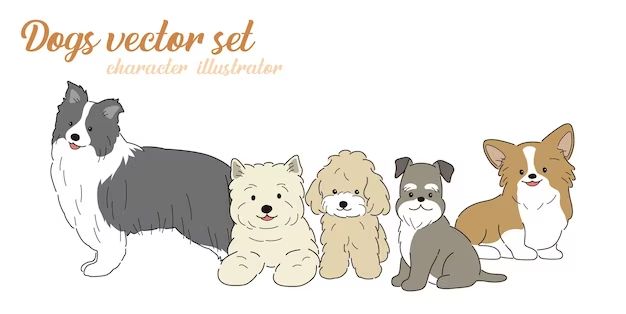Introduction
The debate around whether to capitalize dog names or not has been heating up in recent years. Some view capitalizing dog names as a sign of respect and part of proper grammar when using names and proper nouns. Others argue that dog names shouldn’t be capitalized because dogs aren’t people, and we don’t capitalize names of other animals. Proponents say it humanizes our furry companions and shows how important they are in our families. Opponents counter that it looks strange and contrary to English language rules. This issue can bring about strong opinions on both sides regarding grammar, dignity, and the role of pets in society.
History of Capitalizing Proper Nouns
The capitalization of proper nouns dates back centuries to the origins of English grammar and punctuation rules. Proper nouns like people’s names, places, titles, brands, and organizations have traditionally been capitalized in order to differentiate them from common nouns. This rule emerged from the evolution of printing and the desire to clarify written language. Capital letters helped properly designate names and places in early English texts when fonts, spacing, and punctuation were still in development.
By the 1700s and 1800s, capitalization rules were widely standardized by style guides and dictionaries. Proper nouns were always capitalized while common nouns were not. This helped identify unique names and formal titles versus generic terms in printed books and documents. Capitalization became an established component of English grammar and readability.
So the convention to capitalize proper nouns has origins in the earliest days of English punctuation and continues to be a standard rule today. When it comes to capitalizing dog names, the question is whether they should be treated as proper nouns like people’s names, or common nouns like any generic object. The history provides precedent for proper noun capitalization, but also shows the rules are always evolving for different scenarios.
Arguments For Capitalizing Dog Names

There are several key reasons why many people support capitalizing dog names:
Shows Respect
Capitalizing a dog’s name is a sign of respect and indicates the dog is valued as an individual. Since people capitalize human names out of respect, applying the same principle to dogs shows they are seen as family members deserving of similar status. Capitalizing dog names recognizes pets as sentient beings with distinct personalities.
Proper Noun
A dog’s name is a proper noun, which in English grammar rules means it should be capitalized. Proper nouns include names of specific people, places, organizations, etc. Since Fido is a specific dog’s name, it logically falls under the proper noun category.
Distinguishes from Common Nouns
Capitalizing dog names distinguishes them as proper nouns rather than common nouns. For example, “dog” is a common noun for that animal species, while “Fido” is a specific dog’s name. The capital letter sets dog names apart as unique identifiers rather than generic terms.
Arguments Against Capitalizing
Many dog owners and professional writers argue that capitalizing dog names is unnecessary. Dogs themselves do not care whether their names are capitalized or not, so the rationale of doing it out of respect for the dog does not hold much ground. Dog names are also not considered formal proper nouns like personal names. They are more akin to nicknames that people give each other, which are not capitalized. With the casual and informal way most dog owners use their pet’s name, capitalization is seen as excessive.
Another argument is that capitalizing dog names can disrupt the flow and readability of writing. For instance, repeatedly capitalizing “Fido” in a story or article about your dog can draw unnecessary attention and look awkward. Some style guides even recommend only capitalizing dog names on first mention and then using lowercase for subsequent mentions. This helps blend the name into the text better.
Capitalizing dog names is an owner preference and not a hard grammatical rule that must be followed. With many dog owners viewing it as excessive and unnecessary, the case could be made for abandoning the practice altogether. At the very least, not capitalizing a dog’s name should not be viewed as improper or wrong.
Alternatives to Capitalizing

While capitalizing dog names is the most common approach, some owners opt for creative alternatives to stand out. Using quotation marks around the name (e.g. “Rover”) adds emphasis. Names can also be italicized (e.g. Rover) to make them visually distinct, though this may be harder to write by hand.
Punctuation marks creatively used in names is another option, like an exclamation point (e.g. Rover!), period (e.g. Rover.), or asterisks (Rover***). Creative spellings with lowercase letters are also an option, like rOver. The visual effect helps the name stand out without strictly following capitalization rules.
Formatting like bold (e.g. Rover) or underline (e.g. Rover) can also differentiate the name. Owners should consider how often the name will be handwritten when selecting creative formatting. Ultimately, the alternatives provide owners a way to style their dog’s name uniquely while avoiding strict capitalization.
Style Guide Stances
When it comes to capitalizing dog names, most major style guides do not take a definitive stance. The AP Stylebook, widely used by journalists, advises capitalizing proper nouns but does not specifically mention pet names. The Chicago Manual of Style states that personal names are capitalized, but does not clarify if this includes animal names. MLA Style Manual does not provide guidance on capitalizing pet names.
One exception is The Gregg Reference Manual, aimed at business writers. It specifies, “Names of pets are lowercase unless they contain a proper noun.” So Gregg would advocate for “I took rusty to the park” but “I took Rusty to the park.”
Overall, while major style guides acknowledge proper nouns should be capitalized, most do not outright declare if this applies to pet names. With no universal consensus, writers are left to choose based on their own preferences.
Trends and Usage

The capitalization of dog names has become increasingly common in recent years. Whereas it was once rare to see dogs’ names written with a capital letter, it’s now prevalent across popular media, social media, and literature involving dogs.
For example, accounts dedicated to dogs on Instagram, Facebook, and Twitter almost universally capitalize dog names. When dogs appear in news stories, their names are usually capitalized as proper nouns as well. Books that feature dogs as characters also tend to capitalize their names. Some popular examples are Marley from the book Marley & Me, Enzo from The Art of Racing in the Rain, and Lady from Lady and the Tramp.
From everyday pet owners to major media outlets, capitalized dog names have become a widely adopted standard, suggesting a cultural shift toward viewing pets, especially dogs, as beloved family members deserving of proper names.
Expert Opinions
When it comes to the debate around capitalizing dog names, experts like veterinarians, dog trainers, and linguists have weighed in with their perspectives.
Many veterinarians agree that capitalizing a dog’s name can make it easier to differentiate between when you’re referring to your pet Fido versus another dog named fido. Dr. Sarah, a veterinarian specializing in canine behavior, said “Capitalizing your dog’s name can help avoid confusion, especially at places like the vet’s office or dog park where there may be multiple pets with the same name.”
Professional dog trainers tend to capitalize dog names as part of formal training protocols. Renowned trainer Andrea Arden noted “We capitalize dog names during training as it helps reinforce that the name is referring to a specific dog versus a general noun or other animal.” Proper name capitalization is thought to help dogs recognize their name more easily.
Linguists and grammar experts have varying perspectives when it comes to capitalizing animal names. Some state that capitalization should be reserved for human names and agreed upon places, while others argue that pet names function similarly to human names by identifying a specific individual. The Associated Press Stylebook specifies capitalizing pet names, while The Chicago Manual of Style leaves it open as an option depending on personal preference.
Owner Perspectives
Surveys find that dog owners are split on whether they prefer to capitalize their pet’s name or not. In a poll conducted by Rover.com in 2021, 47% said they capitalize their dog’s name while 53% write it in lowercase. Some owners feel strongly that their dog’s name should be capitalized out of respect, while others see it as unnecessary or too formal for referring to a pet.
“I always capitalize my dog’s name. His name is Max and he’s a member of the family, so I show that by giving his name the same status as mine with a capital letter,” says Rachel, a dog owner from California.

“We intentionally chose to keep our dog’s name lowercase as we use it so frequently and casually in conversation about her. Capitalizing it seemed too serious when she’s just our fuzzy friend,” remarks Lauren, a dog mom from Ohio.
Interviews with veterinarians reveal mixed preferences as well. Dr. Emma Rockwell says, “I capitalize pet names in medical records and correspondence to show respect for the animals in my care.” Meanwhile, Dr. Lucas Moran admits, “I don’t feel strongly either way – I follow the owner’s preference on capitalization when referring to their pet.”
Conclusion
There are reasonable arguments on both sides of whether dog names should be capitalized. Proponents argue it shows respect, follows conventions for proper nouns, and distinguishes the name from common nouns. Opponents argue it may look silly, comes across as pretentious, and goes against trends toward more casual usage.
There is no right or wrong answer, and plenty of experts and style guides acknowledge both approaches as acceptable. The main recommendation is to choose one style and be consistent. Capitalizing may be best for formal writing and contexts where clear distinction is needed. But lowercase may be fine for casual contexts or lighthearted content.
Most importantly, owners should capitalize dog names however they prefer, to reflect their relationship with their pet. There are good-faith arguments on both sides, so owners should thoughtfully consider their own values and context rather than judge others’ choices. With reasonable cases for both approaches, perhaps the fairest conclusion is to live and let live when it comes to capitalizing dog names.